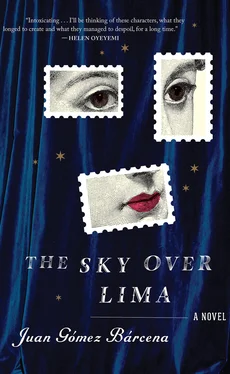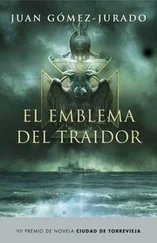It seems incredible, but that’s what the Maestro’s letter said; that’s what José tells him now.
◊
He pauses again. Takes a swig from the bottle of pisco. Like the drafts of his letters, José’s words seem to be filled with erasures, with silences. Holes in which whole chapters are dismantled page by page; fragments of things he will never tell Carlos, because perhaps they do not matter. And this pause is so long that by the time he speaks again, a couple of chapters have simply vanished. And now José has ended up all alone with his own novel. It’s as if there’s been a corporate dissolution, one of those separations of estates that they studied in their labor law class. After the divvying up, Ventura and his friends have gotten the opium den, the bullring, the club, the billiards tables, and the brothels of Acequia Alta and Monserrate. José has only the letters and a predicament: how to reply to Juan Ramón. He keeps writing, and the others keep carrying on more or less the same old way in the same old places, now without poems or commitments or novelistic dénouements to consider.
At first he weighed the two options he and Ventura had planned out: the pious ending and the spicy ending. Trot out Georgina the married woman or Georgina the nun, and the Maestro would abandon his plans to set sail. But it was too late to try to cram religious vocation into the novel, and much too late to cook up a marriage. Neither the convent nor the church was an option, then, and it was all Juan Ramón’s fault, since he’d pushed the plot along too quickly. The great works of Literature , averred Professor Schneider in one of his mandates, never succumb to the temptation of the unanticipated or sensationalist ending. Didn’t Carlos remember that counsel? Was it at all reasonable that, after a mere forty-one letters, after eighteen months without a poem, one of the protagonists would decide to make no less monumental a gesture than crossing the Atlantic? He hadn’t even seen a photograph! You ask, my dear Juan Ramón, if I am aggrieved that you requested a portrait? No! I hope you do not believe me to be so ungenerous in spirit. Only wait, it will come, but first it is only fair that you send me one of you. Would a beautiful woman ever pass up an opportunity to reveal her face? Georgina might be fat, or homely, or deformed, or pockmarked — a poxy lover is such a difficult thing to accept! Or, more likely, she might simply be ordinary, indistinguishable from the Spanish women who pass beneath the poet’s balcony each morning. That sort of blind heroism, traveling halfway around the globe to pull back the curtain on a dream, is the kind of thing you see in serial novels and bad melodramas, you know it’s true, Carlos. And how could José have known, how could anybody have suspected that the Maestro would turn out to be such a dreadful protagonist?
And so he had only one option: The ending that wasn’t really an ending, that was hardly more than a pause or a blank page. Georgina, fallen ill. Would Juan Ramón venture to board a ship if his beloved were far from Lima in a sanatorium and surrounded by her family? José imagined not, so he inflicted upon his Georgina a series of fevers that knocked her out for days — nay, entire weeks! — at a time. How about this: I received your latest epistles while not yet fully recuperated from an illness that kept me confined to bed for weeks , read the letter. And then a dash of drama, because her family, alarmed, had taken her to a sanatorium in Barranco, and then to another in La Punta, believing her to be on her deathbed— I must ask you to postpone that journey you’ve mentioned, please understand, though I cannot tell you not to come, the doctor insists that I should not experience any surprises or strong emotions, and the feelings you describe are too immense to be contained in a body as frail as mine; a dry cough still occasionally racks my chest.
And that plea should have been enough, but it was not enough, because Juan Ramón is afire and will not hear reason. Maybe the letter frightened him, or maybe he surmised it was a case of tuberculosis — though José would never be so boorish as to make his protagonist succumb to tuberculosis, of all the cheap clichés — or, worse, maybe he remembered the plot of Jorge Isaacs’s María and thought that his beloved, too, might inexorably die, that there was no time to lose. In any event he answered just yesterday, I shudder to think of it, Carlos, just a single sheet of paper with a few frantic scrawls— Why wait any longer? says the letter. I will take the very first ship, the fastest one, which will bear me swiftly to your side. You can tell me in person, the two of us sitting on the seashore or in your fragrant garden with birdsong and moonlight. Birdsong and moonlight! See, Carlos? Birdsong and moonlight, no less, as if it were the tawdry dialogue from a serial novel, an installment with the prince and the whore of the who-the-hell-knows seas, the kind of garbage that only housemaids and seamstresses enjoy. And what am I going to do now, what are we going to do? I haven’t been able to sleep all night! Who’s to say that imbecile hasn’t set sail, that he isn’t already in El Callao, sniffing around Georgina’s door, my door, right this moment? You have to help me, Carlos — you’re the only one who can come up with a happy ending for this novel.
◊
The fire is dying down, and Carlos has to get up several times to feed it. It’s been so long since he’s written letters or poems that there is no scrap paper left, so he ends up digging through the rubbish piled up in the corners. He patiently pulls out dusty cloths, pieces of broken furniture, burlap sacks. Pries loose a few planks.
José starts to get up.
“Let me help…”
“No need.”
Carlos pokes the rags and splintered wood in through the door of the potbelly stove. José watches him silently. He seems to recognize a seriousness, a new determination in Carlos’s movements. Actually, the whole scene is eerily reminiscent of his fantasies of artists living in a Montmartre garret: clochards warming themselves by burning their poems and, when those run out, piece by piece pulling apart the walls, the ceiling, and even the floor until they are huddled in the heat of the stove under the implacable Parisian sky. But José doesn’t have time to think about that tonight. Instead, he keeps repeating the same thing: Carlos, what are you doing, sit down already, aren’t you going to say anything?
After a few minutes, Carlos sits down at last. It seems like he’s going to say something, but then he doesn’t. José waits patiently — at least he tries to wait, tries to be patient. He doesn’t manage it. He has decided to count to fifty before he speaks, to give Carlos fifty opportunities to speak first, but by the time he makes it to twenty, the question is already coming out of his mouth.
“Are you going to help me?”
Carlos only glances at him. He shrugs.
“You should ask Professor Cristóbal for advice. I don’t have anything to do with that anymore.”
There is no bitterness in his voice, only the neutral tone of someone expressing an incontrovertible truth. José fervently objects. Of course not, what is he talking about, hasn’t he heard a single word he’s said? He tries to apologize, to tell him they wouldn’t have made it this far without him, that there’s no getting out of this predicament without him, that the novel is his too and always has been, how could he doubt it.
“Anyway, I already talked to the Professor. Just this morning. I went to see him in the plaza and told him everything. That Georgina wasn’t anyone’s cousin, that it had all started as a joke and then got out of hand, that there was no malice in it. Brought him up to speed, basically. You know what he told me? He said he knew it from the start. The rascal! I don’t buy it, though — I know we fooled him, just like we fooled everybody else, even if he’s pretending to be clairvoyant now. And then there’s the question of those ethics he’s always going on about. Why would he have broken those famous rules of his to cultivate a romance if he knew it was a farce? I asked him that, naturally.”
Читать дальше












